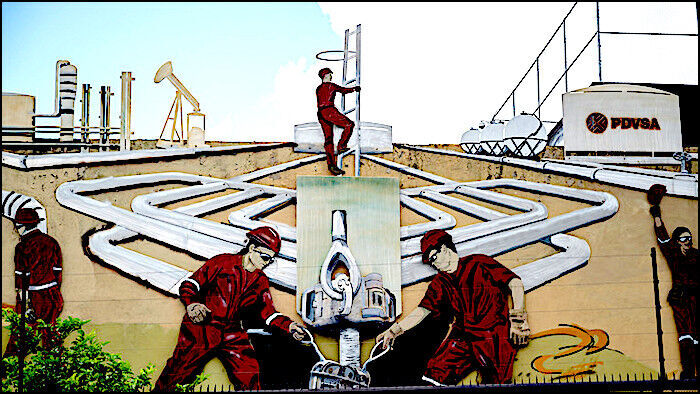
Six months ago, high oil prices in America amid Western sanctions against Russian oil and gas sent the Biden administration scrambling for more supply that it could control - and ideally profit from.
Washington couldn't influence Russia and Saudi-led OPEC, or relent on the ideologically-driven sanctions idiocy, but it could at least maybe dial up or down the supply to mitigate domestic political fallout of any resulting price increases. So the White House considered the cards it could play, and offered Venezuela a deal to lift the American boot off its neck. It's probably just a coincidence that the country happens to have the largest oil reserves on the planet - largely untapped.
There's also the added bonus of rapprochement to counter China and Russia's advances in Washington's backyard, or mitigating the influx of migrants from Venezuela to the US as a result of people fleeing a country struggling under a seemingly endless embargo.
So Washington turned to the same Venezuelan President Nicolas Maduro whom it indicted on "narcoterrorism" charges in 2020 - the same guy the US spent years delegitimizing by promoting another Venezuelan politician as the "real" president of the country. But instead of black-bagging him to collect the $15 million bounty they're offering for information leading to his capture or conviction, the Americans made a deal with him.
Thanks to the US, Maduro had a few problems, but maybe those could go away, if he'd be willing to play ball with America on its own terms. American oil giant, Chevron, scored a license to pump Venezuelan oil in November 2022 - a month after the sanctions waiver was implemented - and in exchange, the US would unblock some of Caracas' oil sale cash that had been confiscated as a result of US sanctions. Until now, the US simply allowed Venezuelan state oil giant Petroleos de Venezuela (PDVSA) to export oil to the US market while invoking sanctions to seize its profits through PDVSA's American subsidiary, Citgo, confiscating billions in Venezuelan oil revenue. Where did all that cash go? To fund Washington's regime change puppets, back when the entire Western world was referring to handpicked Juan 'Who?' Guaido as the legitimate president of Venezuela.
But since the Guaido project flamed out and Maduro was still in charge when the Ukraine conflict upended global oil markets through Western sanctions lunacy, the US sucked up any pride that it may have had left and said that it would let Venezuela get its hands on some of its own cash. Suddenly, Chevron was back plundering Venezuela's black gold in exchange for Maduro promising to play nice in national elections. Just last month, Chevron announced a new drilling plan for Venezuela in a joint venture with PDVSA, with the goal of increasing output by 35% year-on-year by bringing new wells online. And a month before that, Chevron ramped drilling back up in the Orinoco Belt.
Six months later, Washington has now let the sanctions waiver expire, and any temporary business licenses to operate in Venezuela along with it. Not that Chevron has much to worry about. The Biden administration has underscored that oil companies' continued licensing would be considered on a case-by-case basis. Which sounds like a convenient way for Washington to keep the market for itself, or at least decide who gets access. Everyone else gets scared off by sanctions.
Using sanctions as an instrument to control the global playing field isn't new. It's just getting harder to do amid increasing options as the rest of the world diversifies away from a Western-dominated global order. In February 2020, the US Treasury Department's Office of Foreign Assets Control (OFAC) sanctioned Russia's Rosneft state oil company on accusations that it "brokered the sale and transport of Venezuelan crude oil" - something that the US will no doubt be cool with American competitors doing. "The United States is determined to prevent the looting of Venezuela's oil assets by the corrupt Maduro regime," then-Treasury Secretary Steven Mnuchin said, as the US was literally looting Venezuela's oil assets and withholding the profits.
So what did Maduro do to give Washington an excuse to slap sanctions back on? Apparently it has to do with the disqualification of opposition candidate Maria Corina Machado from the presidential elections, set for July 2024. Disqualified by the Supreme Court for 15 years, Machado (whose candidacy has since been replaced by that of a former diplomat) is accused of involvement with "the corruption plot orchestrated by the usurper Juan Guaido," and the marginalizing of the country which led to "dispossession of the companies and wealth of the Venezuelan people abroad, with the complicity of corrupt governments." Machado did thank Israel for intervening in Venezuelan affairs by recognizing Guaido as the Western-selected interim president, and has argued in favor of the country's National Assembly invoking an article that would allow it to authorize foreign missions inside Venezuela, arguing in favor of a "responsibility to protect" — the same provision that led to regime change in Libya under the slippery pretext of "humanitarian" intervention.
Washington wants Venezuelan elections to be as democratic, free, and fair as its own. Which are super clean. Just ask former presidential candidate Senator Bernie Sanders, who was railroaded in the 2016 primary by the Democratic National Committee in collusion with the campaign of his rival, Senator and former First Lady Hillary Clinton, according to leaked documents posted online. Anything that Washington perceives to fall short of this stellar standard gives it an excuse to move the goalposts - once its own have had a chance to score some touchdowns.
While democratic failings are cited, maybe the waiver cancellation now has more to do with the fact that US oil prices have fallen, production has skyrocketed at home, and domestic demand is now low. Perhaps Venezuela's untapped oil potential was too much of a good thing, and there wasn't any point in demanding that Maduro set a table for everyone to dine when he could just be having a romantic tête-à-tête - or more like an arranged marriage - with Washington's favorites. The party's over for everyone else and they're now kindly being asked to leave before the cops (or OFAC) show up.




Reader Comments